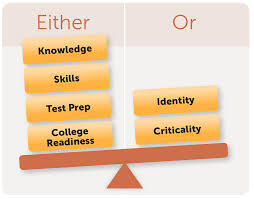This is not a book review. It is a celebration.
Officially released in December 2019, Cultivating Genius caught fire in the pandemic era, becoming a widely popular resource for ensuring equitable classroom learning experiences. Two years later, this masterwork by Dr. Gholdy Muhammad via Scholastic Publishing deserves its spotlight – better yet, birthday candles – for a few key reasons.
The Framing
Q: What’s Black History Month without Carter G. Woodson?
A: A massive array of ahistorical deviance, a new kind of isolated observance that is often ill-founded – freely reframed, remixed, and even renamed – rendering its specific, intentional, and well-defined purposes obsolete.
Black History Month ceremonies in schools scarcely recognize, understand, and honor Woodson’s work. And, if he was still alive, Woodson probably would scarcely recognize, understand, and honor these ceremonies.
Conversely, historical context is a salient strength in Cultivating Genius. Instead of spinning a new big idea, Dr. Muhammad highlights and synthesizes heritage. At its core, her Historically Responsive Literacy (HRL) framework recognizes, understands, and honors African American intellectual traditions that precede her by centuries.
The Beauty
Practically all of the ideas in Transforming Education’s Guiding Beliefs, Core Values, and Commitments match the premise of Cultivating Genius and its HRL framework. These are lovely, transformative notions of educators doing ongoing internal self-work that extends outward to effective learning facilitation that no longer routinely miseducates black, brown, and other predictably marginalized students.
HRL extends across content areas, literacies, and diverse texts, including students themselves as well as their social contexts. Muhammad’s framework features four pursuits – identity, skills, intellect, and criticality – to place equity at the center of social, emotional, and academic learning.
Yet, the language of educational equity is not the labor of educational equity.
The Challenge
As youthful poet Amanda Gorman poignantly proclaimed at the 2021 U.S. presidential inauguration, “the norms and notions of what just is, isn’t always justice”. Educational leaders’ pursuit of an antiracist whole child path, for example, is adverse to the status quo in U.S. school systems.
Muhammad’s beautiful, historically grounded framework for educating all students does not easily harmonize with test-centric schooling that has increasingly dominated U.S. student experiences for at least two decades. Commonplace segregation of skills and intellect versus identity and criticality, as symbolized in this graphic from page 59 in the book, positions complementary educational elements as opposing forces.

This is a glaring limitation of school systems organized and governed more like Fortune 500 companies than learning organizations that prioritize relationships, high-level critical thinking, relevance, civic engagement, and more. Systemically, the schooling process outweighs educator praxis.
Development of identity and self-awareness for all learners is too often viewed as isolated or additional work, not essential to curriculum and instruction. As for social awareness, depending on whose opinion you value, Muhammad’s definition of criticality can be dismissed as harmful indoctrination that has no place in schools.
The Question
So, who is fit to operationalize Dr. Muhammad’s HRL Framework by prioritizing identity, skills, intellect, and criticality in designing student learning experiences? Perhaps this big, tough question is what makes Cultivating Genius most valuable.
Readers know what is at stake and what is to gain, as Muhammad clearly explains the why, what, and how across 170 pages. As educators, we know that the front line of the fight for equitable education is classroom curriculum and instruction. The only variable is which classroom leaders will show up ready to fight every day.
The Rabbit Hole
After exploring this book individually as well as with dozens of educational leaders, I was further inspired to highlight and synthesize heritage like Dr. Gholdy Muhammad. So I began a historical study of traditional African American educational context, perspective, philosophy, practice, and success.
As I learn to better recognize, understand, and honor what has come before me, I keep in mind that my intellectual practice is vain unless it bears fruit on the front line. My work impacts my world.
I am inspired, appropriately challenged, and enthusiastic as I light two candles for Cultivating Genius. Happy birthday to a gift that keeps on giving.
References:
Blakes, B. (2019, November 6). Coulda Shoulda Woulda https://scholaremcee.com/coulda/
Muhammad, G., Love, B. L., & Scholastic Inc.,. (2020). Cultivating genius: An equity framework for culturally and historically responsive literacy.


